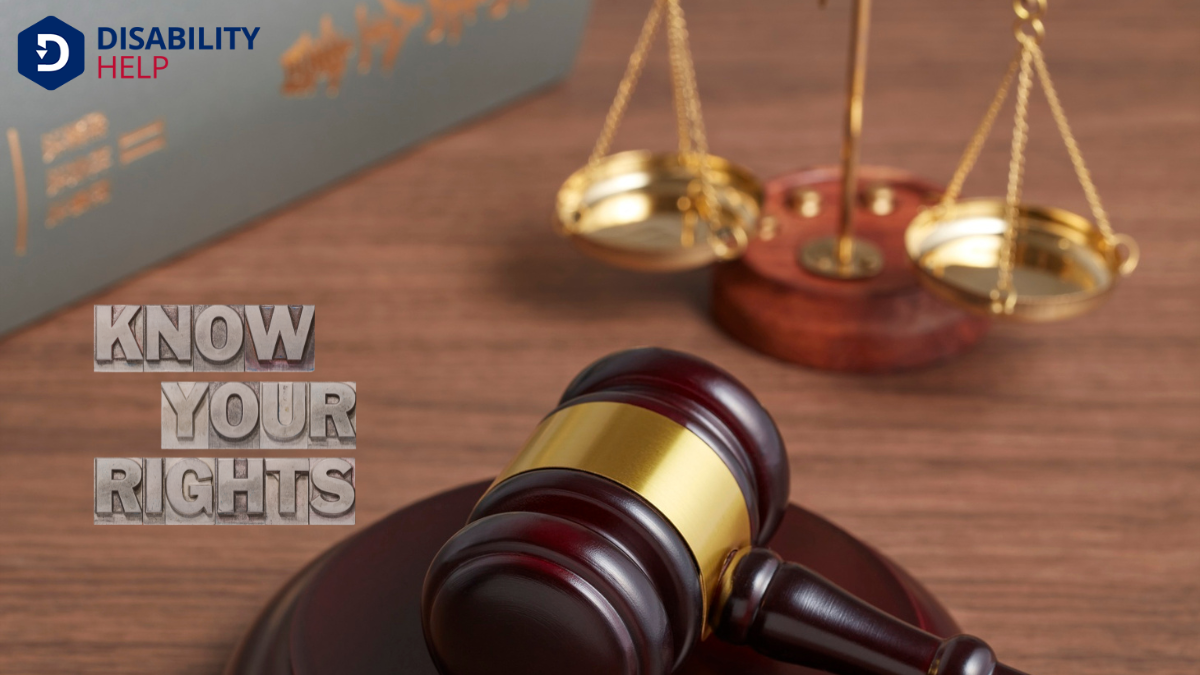When we're faced with disability discriminationUnfair treatment of individuals based on their disability in areas such as employment, education, an..., it's vital to know the steps to take in filing a complaint. We'll start by identifying signs of discrimination and understanding our legal rights. Next, gathering solid evidence will be imperative. Once we pinpoint the right agencyThe capacity of individuals with disabilities to act independently and make their own choices., crafting a well-documented written complaint is key. Timely submission and diligent follow-up are required, and sometimes legal advice can be invaluable. Let's explore each step to guarantee our voices are heard.
Key Takeaways
- Recognize signs of disability discrimination, like exclusion from promotions or inaccessible workspaces.
- Understand your legal rights under the ADA and RehabilitationThe process of helping individuals with disabilities achieve and maintain their optimal physical, se... Act for reasonable accommodationsModifications or adjustments in healthcare settings to support patients with disabilities..
- Gather evidence such as witness statements and medical records to support your claims.
- Identify the appropriate agency for filing your complaint and prepare a detailed written submission.
- Ensure timely submission, follow up diligently, and seek legal advice or support if needed.
Recognize the Signs of Disability Discrimination
Disability discrimination often lurks in the shadows, and it's vital for us to spot it early. We must remain vigilant to recognize subtle signs that might otherwise go unnoticed.
Look for patterns where individuals with disabilities are consistently overlooked for promotions or excluded from meetings. If we notice inaccessible workspaces or policies that disproportionately impact those with disabilities, these could be red flags, too.
We should also be aware of any changes in behavior towards someone after they disclose their disability. This might include suddenly negative performance reviews or unwarranted criticism.
By staying alert to these signs, we empower ourselves to take informed action. Let’s guarantee our workplaces are inclusive and fair, where everyone has an equal opportunity to thrive.
Together, we can make a difference.
Understand Your Rights Under the Law

Recognizing the signs of discrimination is just the first step; knowing our rights is equally important. We must understand the protections offered under laws like the Americans with Disabilities Act (ADA)A U.S. law that prohibits discrimination against individuals with disabilities in all areas of publi... and the Rehabilitation Act.
These laws guarantee that we’re entitled to reasonable accommodations and protection against discrimination in the workplace, schools, and public spaces.
It’s essential to know that employers and institutions can’t legally treat us unfairly due to our disability. Our rights include being able to request necessary adjustments to perform our roles effectively.
If we believe these rights are being violated, understanding the legal framework empowers us to take action. Let’s remember that these laws are designed to safeguard our dignity and guarantee equal opportunities for all.
Gather and Document Evidence
When we're preparing to file a disability discrimination complaint, gathering evidence is essential.
Let's focus on collecting witness statements and organizing our medical records to strengthen our case.
Collect Witness Statements
While gathering evidence for a disability discrimination complaint, it’s essential to collect thorough witness statements that can corroborate your experiences.
These statements can strengthen our case by providing additional perspectives on the events in question.
Let’s guarantee we’re getting all-encompassing information by considering these steps:
- Identify Key Witnesses: Reach out to coworkers, supervisors, or anyone who directly observed the incidents.
- Conduct Interviews Promptly: Memories fade over time, so it’s vital to gather accounts while details are fresh.
- Request Written Statements: Encourage witnesses to write down their observations, ensuring accuracy and detail.
Organize Medical Records
Let's explore organizing your medical records, an essential part of building a solid disability discrimination case. First, gather all relevant documents, including diagnoses, treatment plans, and any correspondence with your healthcare providers. These records will help establish the nature and extent of your disability, which is critical for your case.
Next, verify your records are up-to-date and complete. Missing or outdated information can weaken your case, so double-check everything. It's helpful to create a chronological file, making it easier to reference specific details quickly.
Finally, consider keeping a digital copy for convenience. This way, we can access them anytime, anywhere. Organizing these records effectively strengthens our position and facilitates a smoother complaint process, giving us a better chance of success.
Identify the Appropriate Agency for Your Complaint
Let's figure out which agency has the right jurisdiction for our complaint, as this will guide us in the right direction.
We need to decide between federal and state agencies based on our specific situation.
Once we've done that, understanding the agency's requirements will help us navigate the process smoothly.
Determine Jurisdictional Authority
When addressing a disability discrimination complaint, it's crucial to determine the right agency to handle your case effectively.
We need to guarantee that our complaint reaches the correct jurisdictional authority to avoid delays and maximize our chances of a fair resolution.
To do this, let's consider a few key factors:
- Type of Discrimination: We must identify whether the discrimination occurred in employment, housing, or public services to choose the appropriate agency.
- Location of Incident: The jurisdiction may vary based on where the incident happened, as different regions have distinct agencies and regulations.
- Specific Circumstances: Certain cases might require specialized agencies, such as those focusing on education or transportation.
Federal vs. State Agencies
Although maneuvering through the process of filing a disability discrimination complaint can seem intimidating, understanding whether to approach federal or state agencies is vital.
We've got two primary options: the federal Equal Employment Opportunity Commission (EEOC) or your state’s fair employment agency. Generally, the EEOC handles complaints involving employers with 15 or more employees. In contrast, state agencies might accept cases with smaller employers, offering broader protections depending on state laws.
To decide where to file, we should consider the specifics of our situation, such as the size of the employer and the protections under state law.
Researching both federal and state options guarantees we choose the most effective path. Remember, each jurisdiction has unique guidelines and timelines, so review them carefully.
Navigating Agency Requirements
Before diving into the complaint process, it's essential to pinpoint the right agency that aligns with our needs. This step guarantees our complaint is addressed efficiently and accurately.
We must consider:
- Jurisdiction: Determine whether our issue falls under federal or state jurisdiction. The Equal Employment Opportunity Commission (EEOC) handles federal cases, while state agencies manage local concerns.
- Time Limits: Understand the deadlines for filing. The EEOC typically requires complaints within 180 days of the incident, but this can vary by state.
- Specificity: Some agencies specialize in particular types of discrimination. Researching these specializations helps guarantee our complaint reaches the most knowledgeable hands.
Prepare Your Written Complaint

Crafting a strong written complaint is an imperative step in addressing disability discrimination. Let's begin by clearly outlining the discriminatory actions we've encountered, providing specific dates, locations, and individuals involved. This clarity helps establish a solid foundation for our case.
We should also include how these actions have affected us personally, both emotionally and professionally. It's vital to link these experiences directly to our disability, demonstrating the unfair treatment we've faced.
Next, let's make certain our language remains respectful and factual. We should avoid emotional language that might detract from the facts. Additionally, including any supporting documents, like emails or witness statements, strengthens our complaint.
Submit Your Complaint Timely and Accurately
Timely and accurate submission of our complaint is essential to guaranteeing it's taken seriously and processed efficiently.
We need to be aware of deadlines, as missing them can jeopardize our case. Each agency may have different timelines, so let's verify these details before proceeding.
Accuracy in the information we provide is vital to establishing credibility and avoiding unnecessary delays.
Here's how we can make certain our submission is both timely and accurate:
- Verify all details: Double-check dates, names, and events to make sure they're correct.
- Use certified mail: This provides proof of submission and delivery, offering an extra layer of security.
- Keep a copy: Retain a copy of the complaint and any supporting documents for our records.
Follow Up on Your Complaint
Following up on our complaint is essential to guarantee it doesn't get lost in the shuffle.
We should mark our calendars and set reminders to check the status regularly. When contacting the agency, it’s helpful to note the names of those we speak with, along with dates and times. This builds a record and shows our commitment to the process.
Let's remain patient yet persistent. If we haven't heard back within the expected timeframe, a polite inquiry can help move things forward.
We can also request updates in writing, which provides a tangible record of their responses.
Seek Legal Advice or Representation if Necessary

If our initial efforts to resolve the issue don't yield satisfactory results, we might consider seeking legal advice or representationThe way people with disabilities are depicted in media, culture, and politics, often influencing pub....
Understanding our rights and options can be overwhelming, but a legal professional can provide clarity and guidance. They’ll help us navigate the complexities of disability discrimination laws and determine the best course of action moving forward.
- Assess Our Case's Strength: They'll evaluate the evidence and advise us on the likelihood of a successful outcome.
- Guide Us Through Legal Procedures: Legal experts can assist in filing lawsuits or claims, ensuring we meet all necessary deadlines and requirements.
- Negotiate Settlements: They can represent us in discussions with the employer, aiming for a resolution without going to court.
Seeking legal help can empower us to make informed decisions.
Explore Additional Support Resources
Many of us mightn't realize the breadth of support resources available when dealing with disability discrimination.
It's essential we tap into these resources to bolster our understanding and actions. Local support groups can provide a community of people who’ve faced similar challenges, offering both emotional support and practical advice.
Online forums and social media groups also connect us with others who share our experiences, creating a network of shared knowledge and encouragement.
We should explore governmental and non-governmental organizations that specialize in disability rightsThe legal and human rights afforded to individuals with disabilities, often the focus of advocacy an....
Many of these organizations offer advocacyThe act of arguing in favor of, supporting, or defending the rights and interests of individuals or ... programs, legal aid, and educational materials to help us navigate our situations.
Let’s not hesitate to reach out to these resources, ensuring we’re well-equipped to address and challenge discrimination effectively.
Frequently Asked Questions
How Long Does the Complaint Process Typically Take?
The process's duration varies, often taking several months. Let’s gather all necessary documentation and file it promptly to expedite our case. Staying proactive and informed can help us navigate the system more efficiently. Patience and persistence are key.
Can I File a Complaint Anonymously?
We can’t file a complaint anonymously. Identifying information is necessary to conduct a thorough investigation. Let’s guarantee we gather all relevant details, so our complaint is as strong as possible. We're here to support each other.
What if My Employer Retaliates After I File a Complaint?
If our employer retaliates after we file a complaint, we should document the incidents and report them immediately. Retaliation is illegal, and we have the right to seek further legal action to protect ourselves.
Are There Any Fees Associated With Filing a Complaint?
We comprehend your concern about costs. Luckily, there aren't any fees when filing a disability discrimination complaint with government agencies. We can focus on gathering necessary information to guarantee a strong case without worrying about expenses.
How Do I Track the Status of My Complaint?
To track our complaint's status, we can contact the agency where we filed it. They usually provide a case number or contact information. Let's make certain we regularly check for updates and keep records of our communications.
Conclusion
In maneuvering a disability discrimination complaint, we must stay informed and proactive. Recognizing discrimination and understanding our rights is essential. Let’s gather solid evidence, choose the right agency, and submit a clear, timely complaint. Following up is key to ensuring our voices are heard. If needed, let's not hesitate to seek legal advice or support from advocacy groups. Together, we can make a difference and work towards fair and just treatment for everyone.






